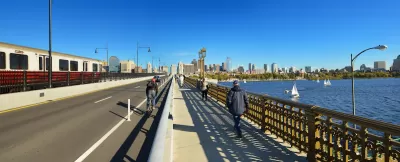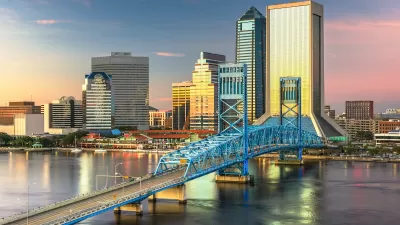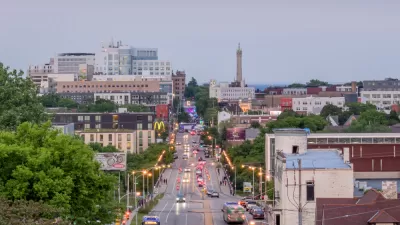A new report assesses the city’s progress halfway through implementation of the ‘Go Boston 2030’ long-range transportation plan.

Writing in Streetsblog Mass, Christian MilNeil describes the progress made by the city of Boston on its Go Boston 2030 plan, which “set goals for the city to reduce the number of car trips inside the city's limits by half and eliminate serious injuries and deaths from traffic violence by the end of this decade.”
A progress report from the LivableStreets Alliance expresses doubt that the city can meet its goal of cutting greenhouse gas emissions from vehicles in half. “According to the city's most recent data, motor vehicles in the city were still pumping 1.9 million metric tons of greenhouse pollution into the atmosphere in 2019, the most recent year for which city-level data is available,” a “statistically insignificant” change from 2005 levels.
Boston made more significant strides in street safety, according to the report. “The city has actually met its 2017 target to reduce pedestrian and bicycle-related collisions by at least 30 percent, seven years ahead of schedule.” The report also praised the city’s “strong progress” on installing protected bike infrastructure and bringing public spaces into Americans With Disabilities Act (ADA) compliance.
Jascha Franklin-Hodge, Boston's Chief of Streets, said in a press release that the city will “launch an official update of the Go Boston 2030 plan to re-focus the city's goals” and adjust to post-pandemic mobility patterns and needs.
FULL STORY: Halfway to 2030, How’s ‘Go Boston’ Going?

Maui's Vacation Rental Debate Turns Ugly
Verbal attacks, misinformation campaigns and fistfights plague a high-stakes debate to convert thousands of vacation rentals into long-term housing.

Planetizen Federal Action Tracker
A weekly monitor of how Trump’s orders and actions are impacting planners and planning in America.

In Urban Planning, AI Prompting Could be the New Design Thinking
Creativity has long been key to great urban design. What if we see AI as our new creative partner?

Florida Seniors Face Rising Homelessness Risk
High housing costs are pushing more seniors, many of them on a fixed income, into homelessness.

Massachusetts Budget Helps Close MBTA Budget Gap
The budget signed by Gov. Maura Healey includes $470 million in MBTA funding for the next fiscal year.

Milwaukee Launches Vision Zero Plan
Seven years after the city signed its Complete Streets Policy, the city is doubling down on its efforts to eliminate traffic deaths.
Urban Design for Planners 1: Software Tools
This six-course series explores essential urban design concepts using open source software and equips planners with the tools they need to participate fully in the urban design process.
Planning for Universal Design
Learn the tools for implementing Universal Design in planning regulations.
Gallatin County Department of Planning & Community Development
Heyer Gruel & Associates PA
JM Goldson LLC
City of Camden Redevelopment Agency
City of Astoria
Transportation Research & Education Center (TREC) at Portland State University
Jefferson Parish Government
Camden Redevelopment Agency
City of Claremont





























